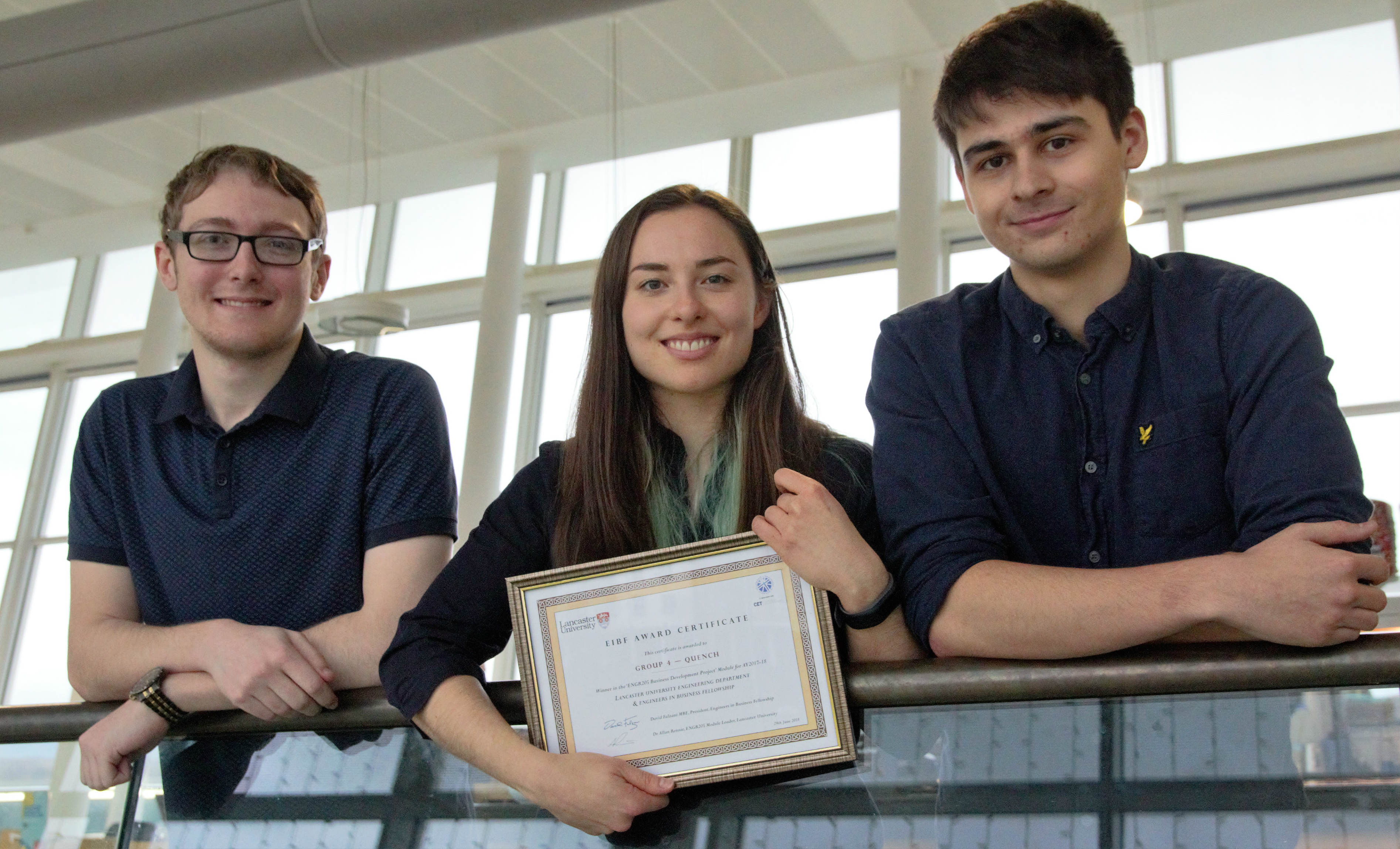Drinks spiking safety cup idea clinches engineering business competition

An innovative drinks cup that can alert users if their drink has been spiked with drugs or excess alcohol has claimed top prize in an engineering student entrepreneurship competition.
The ‘Quench Spike Free Cup’ was chosen as the top business idea as part of the Engineers in Business Fellowship competition. The competition formed part of the undergraduate module ‘Business Development Project’ and involved 135 second-year Engineering students competing in 14 teams.
Dr Allan Rennie, Senior Lecturer at Lancaster University’s Engineering Department and who organised the competition as part of the module he teaches, said: “Undergraduate Engineering students naturally shy away from business and management type modules, preferring the more numerate and technical subjects. However, this particular module, which embeds entrepreneurship and innovation within the curriculum, has gained in popularity in recent years.
“Having taught this module for a number of years, and seeing the diverse range of ideas and skills that the students work hard to develop, skills that they will find invaluable as they progress towards careers as professional engineers, I was keen to provide an opportunity to take these ideas beyond just an academic exercise.
“We were pleased that the Engineers in Business Fellowship also saw the potential in this module, and awarded £3,000 to invest in some of the best business ideas that emerged from the student teams. Real money, to do real things.”
The Quench concept would use coloured detection strips within transparent plastic cups so people could easily see if their drinks have been tampered with.
The winning team, which included Olivia Albrecht, Alexander Cochrane, Nathan Lee, Ahmed Negm, Kelvin Southwell, Jack Bentley, Benoit Ferrand, Alex McGrath, Jaidhish Passary and Daniel Williamson, have been awarded £1,750 prize money. The prize money, which was provided by the Sainsbury Management Fellows in the form of an ‘Engineers in Business Fellowship’, is to be used to further develop their business idea and prototypes with additional support from Lancaster University’s Enterprise Team at ‘Work in Progress’.

Daniel Williamson, Olivia Albrecht and Alex Cochrane
Daniel Williamson said: “The investment rewards gave the module a competitive edge, encouraging greater group engagement and making setting up a business a more appealing route for engineers who hadn’t even considered it. Receiving the money enables our group to gain hands-on experience during the exploration of starting up a business, and an easier path to business success.”
Second place, and a prize of £750, went to Buddyup, an idea for a sports app that would allow users to find sports companions at similar levels of skill and ability within a chosen geographic location.
Third place, and a £500 prize, was awarded to Tech Test, a technology trial service where users can test new technology over short trial periods before committing to buy their own devices.
The final business presentations were judged by an independent panel including: Mo Isap, a board member of the Greater Manchester Enterprise Partnership; Richard Harrison, business owner at Geminus Training; Kursat Celik, an Associate Professor at Akdeniz University in Turkey; and Rachel Cox, Enterprise Education Development Manager at Lancaster University’s Enterprise Team.
Winners were selected based on criteria including their business pitches, the viability of the concepts, as well as consideration of low start-up capital requirements.
David Falzani MBE, President of Engineers in Business Fellowship, said: “Some of the most important global challenges we face in the world today are not just technical challenges but require the ability to link technologies to an understanding of the market mechanism, business skills and entrepreneurial commercial thinking. The EIB prize fund supports universities that give students the opportunity to get a flavour of how business skills and engineering know-how can solve world problems and create wealth for economies.
“We have been impressed with the way in which Lancaster University has enthusiastically integrated the EIB prize into its Second Year Engineering module and inspired such a high calibre of entries and winners. We congratulate each of the winners on their research, creativity and ideas and look forward to supporting the module in the future.”
Simon Harrison, Enterprise Programme Manager at Lancaster University’s Enterprise Team, said: “This is a great example of weaving entrepreneurial learning opportunities into the curriculum around core academic content. As a result, when these students graduate they will already have developed and practiced some of the key capabilities employers are looking for – such as creative thinking, collaborative problem-solving and applied commercial awareness.
“They are prepared for leading entrepreneurial projects, or even launching their own ventures, as they gain insights into where the innovation opportunities in their industry lie.”
Back to News
